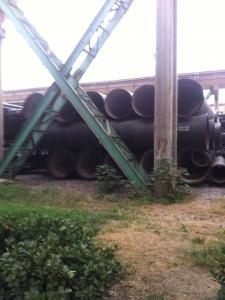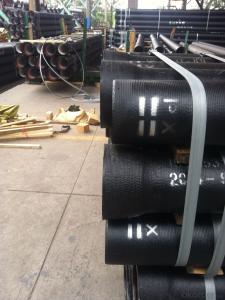DUCTILE IRON PIPE AND PIPE FITTINGS K9 CLASS DN200
- Loading Port:
- Tianjin
- Payment Terms:
- TT OR LC
- Min Order Qty:
- 20 pc
- Supply Capability:
- 3000 pc/month
OKorder Service Pledge
OKorder Financial Service
You Might Also Like
Material : Ductile Cast Iron
Size Range : DN 80mm to DN 2000mm
Unit Effective Length : 6m or 5.7m
Manufacture Standard: ISO 2531:1998/ EN 545:2006/EN 598:2007
Annual capacity : 200,000 tons
Coating Exterior: Zinc 130g/m2 according to ISO 8179-1 and bitumen coating 70 microns.
Cement Interior: Portland Cement/ High Alumina Cement/ Sulphate Resisting Cement Lining according to ISO 4179
Special requirements on external coating and internal lining can be applied
We also provide accessories such as SBR/EPDM rubber gaskets, lubricant paste, pipe caps, PE sleeves, etc.
Additional Parts:
Each pipe is strictly inspected according to related standard to ensure permanently high performance.
Easy Installation at site and service free for life
Long Service Lifespan
Quotation will arrive you within 24hours once we get your inquiry.
We guarantee offering you a competitive price.
A copy of original inspection reports of pipes will be offered after shipment.
Photos of loading process will be sent to the customer after shipment effect.
We will follow-up the delivery progress after shipment effect and update to the customer on weekly basis.
- Q:Are ductile iron pipes suitable for trenchless pipe bursting methods?
- Indeed, ductile iron pipes prove to be an appropriate choice for trenchless pipe bursting techniques. Displaying exceptional strength and durability, ductile iron emerges as a material capable of enduring the formidable forces implicated in the pipe bursting procedure. Its remarkable tensile strength safeguards against the occurrence of cracks or fractures during the bursting process. Moreover, the inner surface of these pipes boasts a smooth texture, which facilitates the efficient flow of fluids such as water. The aforementioned smoothness further diminishes the odds of encountering blockages or accumulation within the pipe. All things considered, ductile iron pipes represent a dependable alternative for trenchless pipe bursting methods.
- Q:How are ductile iron pipes protected against external impact or loading?
- Ductile iron pipes are protected against external impact or loading through various methods. One common method is to apply a protective coating or wrapping on the pipes, which helps to prevent corrosion and reduces the risk of damage from external forces. Additionally, the pipes are often designed with a thicker wall thickness to enhance their strength and resistance to external impact. Furthermore, the installation of appropriate bedding and backfill materials around the pipes provides additional support and protection against external loading. Regular inspections and maintenance practices also play a crucial role in ensuring the long-term durability and protection of ductile iron pipes.
- Q:What are the different lining thickness options for ductile iron pipe?
- The different lining thickness options for ductile iron pipe typically range from 3 to 5 millimeters.
- Q:What are the common causes of failure in ductile iron pipes?
- The common causes of failure in ductile iron pipes include corrosion, external loading, ground movement, manufacturing defects, and improper installation or maintenance.
- Q:Are ductile iron pipes resistant to abrasion or wear?
- Yes, ductile iron pipes are highly resistant to abrasion or wear. Ductile iron, also known as cast iron, is a strong and durable material that is specifically designed to withstand abrasive conditions. The unique microstructure of ductile iron provides excellent resistance to abrasion, making it an ideal choice for applications where pipelines are exposed to high levels of wear. Additionally, ductile iron pipes are known for their long service life, which further demonstrates their ability to withstand abrasion and wear over time.
- Q:How are ductile iron pipes repaired in case of damage?
- Ductile iron pipes are typically repaired through various methods such as spot repair, joint repair, or full replacement. Spot repair involves fixing small sections of the pipe by cutting out the damaged area and replacing it with a new piece. Joint repair focuses on repairing the joints between pipe sections by replacing gaskets or applying sealants. In cases of extensive damage, full pipe replacement may be necessary to ensure the integrity and longevity of the pipeline system.
- Q:How can the ductile iron pipe be tested?
- In the water test, temporary and long-term must be kept warm, in the spare time without water, emptying the pipe in time
- Q:How is ductile iron pipe recycled?
- Ductile iron pipe is a highly durable and long-lasting material used in various infrastructure systems such as water and wastewater pipelines. When it reaches the end of its life cycle, ductile iron pipe can be recycled rather than disposed of in landfills. The process of recycling ductile iron pipe begins with its removal from the ground. Typically, a trench is dug to access the pipe, and it is cut into smaller, manageable sections using specialized equipment. These sections are then transported to a recycling facility. At the recycling facility, the ductile iron pipe is further processed to remove any contaminants. This involves removing any fittings or joints that may be attached to the pipe. Any non-iron materials, such as rubber gaskets or coatings, are also separated and discarded. Once the pipe has been cleaned and prepared, it is usually crushed or shredded into smaller pieces. This step increases the surface area of the material, making it easier to melt down in the next stage of the recycling process. The crushed or shredded ductile iron pipe is then melted in a furnace at high temperatures. This process, known as smelting, converts the solid iron into a liquid state. During smelting, impurities and any remaining non-iron materials rise to the surface and are skimmed off. After smelting, the molten iron is poured into molds to form new products. These molds can be used to produce a wide range of ductile iron products, including new pipes, fittings, valves, and manhole covers. The new products made from recycled ductile iron pipe have the same qualities and durability as those made from virgin materials. Recycling ductile iron pipe not only reduces the demand for new materials but also helps conserve energy and resources. The process requires less energy compared to producing iron from raw materials, which results in a lower carbon footprint. Additionally, recycling ductile iron pipe helps to reduce waste and promotes a circular economy by giving new life to an otherwise discarded material.
- Q:Are ductile iron pipes suitable for use in chemical processing plants?
- Yes, ductile iron pipes are suitable for use in chemical processing plants. Ductile iron is known for its high strength and durability, making it resistant to corrosion and capable of withstanding high pressure and extreme temperatures. Additionally, its smooth internal surface reduces friction and allows for efficient flow of chemicals.
- Q:Are ductile iron pipes suitable for potable water systems?
- Yes, ductile iron pipes are suitable for potable water systems. Ductile iron pipes have been widely used in potable water systems for many years due to their durability, strength, and corrosion resistance. They are designed to withstand high-pressure water flow and can handle the challenges of underground installation. Additionally, ductile iron pipes have a smooth internal surface that prevents the buildup of scale or sediment, ensuring the delivery of clean and safe drinking water. They also have a long service life, making them a cost-effective choice for potable water systems. Overall, ductile iron pipes are a reliable and widely accepted option for potable water supply networks.
1. Manufacturer Overview |
|
|---|---|
| Location | |
| Year Established | |
| Annual Output Value | |
| Main Markets | |
| Company Certifications | |
2. Manufacturer Certificates |
|
|---|---|
| a) Certification Name | |
| Range | |
| Reference | |
| Validity Period | |
3. Manufacturer Capability |
|
|---|---|
| a)Trade Capacity | |
| Nearest Port | |
| Export Percentage | |
| No.of Employees in Trade Department | |
| Language Spoken: | |
| b)Factory Information | |
| Factory Size: | |
| No. of Production Lines | |
| Contract Manufacturing | |
| Product Price Range | |
Send your message to us
DUCTILE IRON PIPE AND PIPE FITTINGS K9 CLASS DN200
- Loading Port:
- Tianjin
- Payment Terms:
- TT OR LC
- Min Order Qty:
- 20 pc
- Supply Capability:
- 3000 pc/month
OKorder Service Pledge
OKorder Financial Service
Similar products
New products
Hot products
Related keywords



























